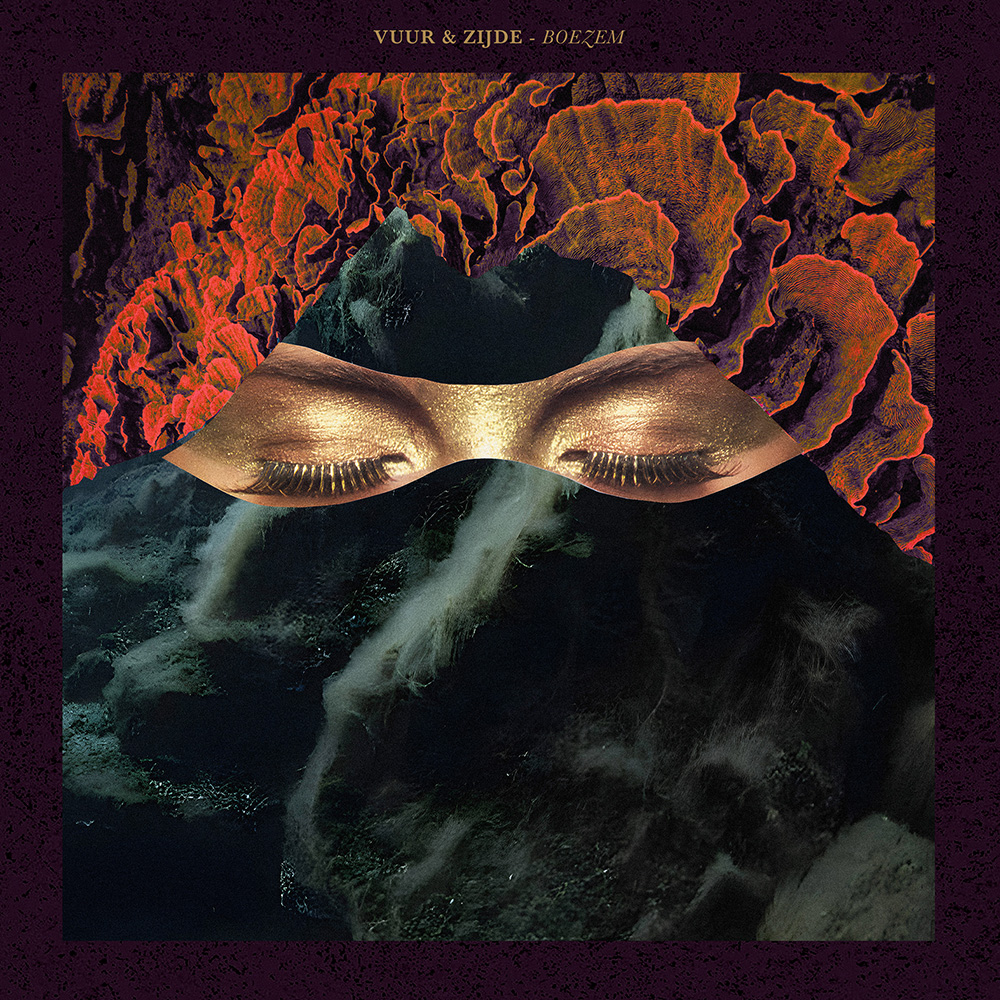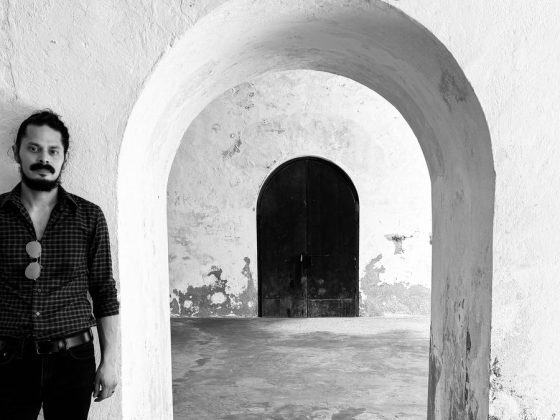Love and heavy metal have always had a rocky romance, with the former frequently claiming the crown in pop’s parade of passions. Things get trickier when black metal steps into the ring, a realm where hate lurks as prominently as melancholy in a blues ballad. The genre’s grim grip on negativity clutches tightly. Where pop croons about love lost and found, black metal snarls and scowls, creating a discordant dance between emotion and aggression.
As Vuur & Zijde evolves from a trio to a quintet, the band breathes fresh air into their music, blending influences with a delicate touch. The shift is subtle but significant, ushering their sound into the shifting sands of post-black metal. Whirling drum assaults and buzzing guitar riffs retain the genre’s grim essence, while a second dimension emerges through inspirations from post-punk pioneers like Cocteau Twins and Dead Can Dance. Synthesizer swells and Famke’s enchanting vocals add a dreamy layer to their palette. Her lyrics, written in Frisian and Dutch, whisper tales from the coastlands up to Denmark, creating a blend of atmospheric allure and melodic mystery.
With Boezem, Vuur & Zijde masterfully melds contrasting forces. The harsh edges of black metal, now twisted into post-black metal, clash with the delicate allure of shoegaze, post-punk, and wave. These elements entwine in an eternal embrace, conjuring tunes that are as enchanting as they are prickly—a sonic symphony akin to a black rose. This interplay of intensity and tenderness gives rise to a new musical landscape, where beauty and barbs dance together in a provocative performance.
Listen to Boezem below and order here.
Vuur & Zijde spoke with Post-Punk.com about the album, the band’s evolution, their influences, and the choice to perform in Frisian.
Can you tell us about how the band formed and whether there were difficulties going forward from right after the beginning of 2019, having the world come to a stop just as you signed with Prophecy Productions?
Nicky: Famke and I made music together before, somewhere in our twenties. The vibe was there, but it didn’t result in something tangible. In early 2019, we started talking about making music again. I still had some unused songs from my old solo project ‘Reiziger’ and after asking Richard to do the drums, we recorded our split with Impavida. As much as I like what we did there, working on new material felt rather lonely and my heart just wasn’t in it. Feeling I needed a change in direction, I asked Sylwin and Carmen to join me in the writing process. I’ve always felt at ease and inspired around those two, and I’m very happy with how they brought their own characteristics to this band.
Having the world come to a halt of course heavily influenced Boezem. We had to cancel our sessions in a studio abroad and find a place that we could easily and safely record. It also changed the writing process, as it was difficult to come together and shape the music collectively. Still, I don’t see these changes as something negative but as a way of adapting to the unforeseen circumstances.
How has the band changed and evolved since the release of the split with Impavida?
Nicky: While I think our music still focuses on atmosphere, I feel that there’s a different energy in the new material. It’s gloomier, more rock-ish.
Famke: As it’s the five of us now, instead of the lonely three we started out with, there’s more influences and input trickling through the songs. The three tracks on the split LP were written for an explicit black metal project, whereas the new album is a cooperative effort, without boundaries regarding genre or style. Our love for black metal still echoes throughout this record, but we’ve taken the liberty to include other musical passions of ours as well, and it makes for a more complete record, with reference to who we are.
Your debut album, Boezem, focuses on themes of conditional and unconditional love, intimacy, and motherhood. What inspired you to explore these topics within the context of a genre that usually doesn’t address more feminine aspects of existence?
Famke: The lyrics were written as a cathartic form of personal expression, in a period of grand upheaval where a lot of fundamentals were swept away beneath my feet. I sort of had to invent a new version of myself. This all happened within frameworks of love and trust, although it was never the intention to write about the expected or unexpected. These “unusual” topics were not something we were purposefully looking for, but always existed alongside us.
I definitely see a post-punk influence in songs like the first single “Zusterzon,” “II,” and especially “Nest.” The single “Naakt,” stands out as also having a strong Cocteau Twins vibe. What post-punk band records did you listen to when you were growing up?
Nicky: Cocteau Twins and Oingo Boingo had an enormous influence on my earlier musical development. Later, acts like The Chameleons and also more modern bands like Ascetic: found their way in my collection.
Famke: I’m still growing up, but I had the privilege of my mother introducing me with acts like Swans, The Cure and Sinead O’Connor at an early age.
Which albums and songs hold special meaning for you and inspired the music of VUUR & ZIJDE and the songs on “Boezem”?
Nicky: Oof, that’s a tough one. I feel that a little bit of ‘Pink Turns to Blue by Hüsker Dü snuck into ‘Omheind’. There’s also a strong Jesu-vibe in the beginning of II and, in ways, Vuur & Zijde expands on the more post-punk-ish elements of my other band Laster.
To us, this album sounds more like old-school gothic rock and ethereal post-punk than black metal. Bands like Killing Joke and Fields of the Nephilim have crossover in the metal scene, as do some of the more Baroque elements of Dead Can Dance. Do you think there is a natural crossover between genres here?
Nicky: I think there’s always a natural crossover possible between genres, as this is how they are formed in the first place. Gloomy music inspires gloomy music, so yes, I’d say the gap between those genres isn’t too big. The more music you listen to, the easier it gets to spot similarities between genres, and the more adventurous it becomes to play with those elements.
Is there a particular song on the album that holds special meaning for you? If so, why?
Famke: Kuier was written at a turning point in my life. It was the moment I found out how to put myself above a certain difficult plight – an exploration in maturing, if you will. Zooming out of the situation, taking an overview of your life, and eventually moving on. Also, I really appreciate Nicky’s and Sylwin’s spoken word adaptation of my lyrics for this song.
What motivated you to include the Frisian language in your lyrics, and how do you think it enhances the overall feel of the album?
Famke: Frysk is my mother tongue. For me writing about matters close to the heart is done best in the language I dream in, thus it enhances the expressiveness of the lines. Also, the subdued phonology of the Frisian language lends itself beautifully for vocals. Curiously, initially more songs on the record were written in Frysk, but during the demo stages we decided to translate these to Dutch, to make them open to collaboration.
What role do you think music plays in dealing with profound life experiences like the ones you’ve gone through, and how do you hope your music will impact your listeners?
Nicky: Music – as many other forms of cultural expression – helps us to broaden our experiences. Many artists have stimulated me to look at big topics in a broad variety of ways, adding – presumably unintended – depth and color to them. Also, it’s nice to have a little soundtrack in your life, to help you jam through its rougher parts.
Follow Vuur & Zijde:
















 Or via:
Or via: